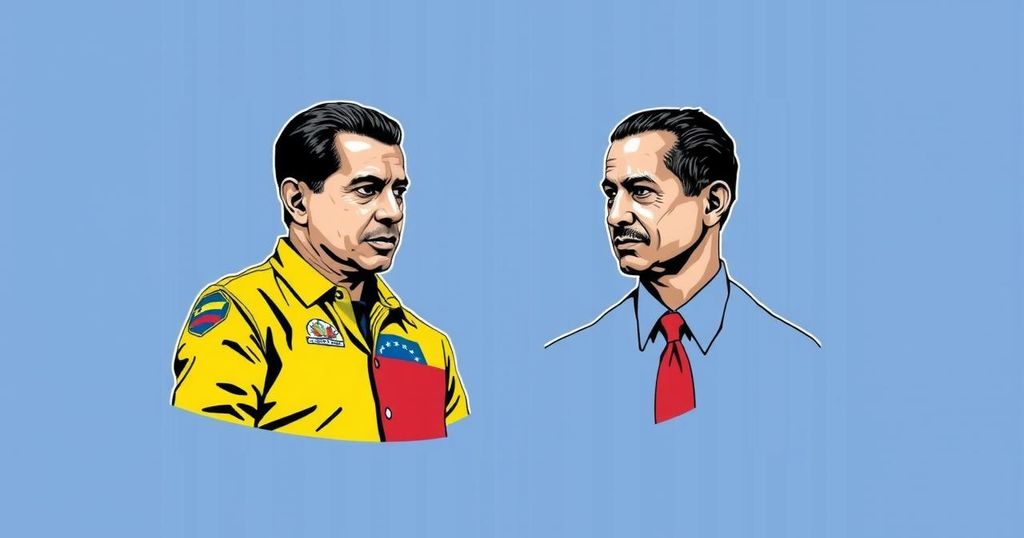Biden Administration Imposes Sanctions on Venezuelan Officials After Disputed Elections

The Biden administration has sanctioned 21 Venezuelan officials in response to the country’s disputed July presidential election, addressing claims of repression and electoral fraud. Despite previous sanctions, the Maduro regime remains strong, prompting ongoing protests and calls for democratic accountability. These measures reflect international concern about human rights in Venezuela as tensions rise between the government and opposition factions.
On Wednesday, the Biden administration implemented sanctions against 21 Venezuelan officials aligned with President Nicolás Maduro. The measures follow the controversial presidential election held in July, which has been marred by allegations of vote-rigging and human rights abuses. The sanctions, unveiled by the Department of the Treasury, pinpoint individuals in high-ranking positions, such as heads of intelligence, corrections, and the minister overseeing Maduro’s presidential office, for their roles in repressing opposition voices in response to post-election unrest. These officials add to a longstanding list of sanctioned figures, including court leaders and prosecutors who have faced prior punitive measures. Despite the sanctions being part of a coordinated effort to undermine Maduro’s regime, questions about their effectiveness persist, as individuals within the regime continue to exert significant control over Venezuela’s governance and economic systems.
The Biden administration recognized Edmundo González as Venezuela’s rightful president-elect last week, contesting Maduro’s self-declared victory in the contested July elections. Despite González’s claims of a significant electoral win, Maduro’s government staunchly opposes these assertions, labeling González’s narrative as fabricated. Venezuelan citizens have since engaged in widespread protests, demanding transparency and the release of official election results, reportedly suppressed by the current administration. In retaliation to international sanctions, Venezuelan lawmakers are advancing legislation aimed at categorizing such sanctions as crimes against humanity, a move indicative of the government’s defiance against external pressures and criticism.
This situation exemplifies the ongoing tension in Venezuela following a contentious election period. Maduro’s refusal to provide official results has only fueled the unrest among citizens and opposition leaders alike. The sustained protests indicate a societal desire for democratic accountability and transparency amid an environment characterized by intimidation and repression. It remains to be seen how international responses, such as these recent sanctions, will impact the viability of Maduro’s regime and the aspirations of the Venezuelan populace for electoral integrity and human rights.
“Maduro and his representatives’ repressive actions in the wake of the Venezuelan presidential election are a desperate attempt to silence the voices of its citizens.” – Acting Under Secretary of the Treasury for Terrorism and Financial Intelligence Bradley T. Smith.
The movement towards sanctions reflects broader international concern over human rights violations in Venezuela, yet the results of such measures are often contentious. The recent actions by the United States signify a continued commitment to hold those accountable for democratic erosion in Venezuela, while the unfolding protests display a populace resolute in its demand for change.
Links to sources referenced have not been provided in the original text, and as such, this section is currently unavailable.
In conclusion, the Biden administration’s recent sanctions against Venezuelan officials underscore an ongoing struggle for democratic representation in the country. The situation remains fluid, exacerbated by claims of electoral impropriety and widespread public dissent against Maduro’s regime. The effectiveness of these sanctions and their potential influence on the eventual political landscape in Venezuela continue to draw considerable scrutiny from both supporters and critics alike.
The current political climate in Venezuela is fraught with controversy following the July presidential election, which was widely disputed. President Nicolás Maduro’s government has faced allegations of electoral fraud and repression of dissenting voices. The international community, particularly the United States, has responded to these developments with sanctions targeting key officials within Maduro’s administration. The opposition, led by figures like Edmundo González, has also been vocal against the Maduro regime’s actions, claiming that the election was unfair and calling into question the legitimacy of Maduro’s victory. This ongoing struggle between the Maduro government and opposition forces reflects deeper issues related to governance, human rights, and democracy in Venezuela.
The sanctions imposed by the Biden administration represent a formal condemnation of the actions taken by Nicolás Maduro’s regime in the aftermath of disputed elections. As Venezuela grapples with significant political strife and societal unrest, the effectiveness of these sanctions will be closely monitored. The international community’s response, together with the persistent demands for accountability from Venezuelan citizens, will play a crucial role in the future trajectory of the nation’s governance.
Original Source: www.newsweek.com








